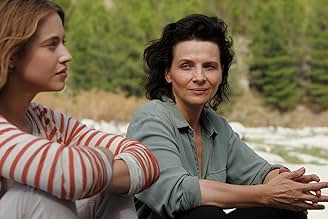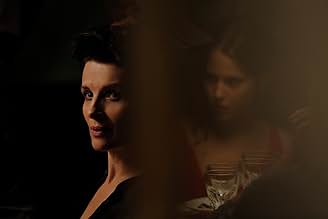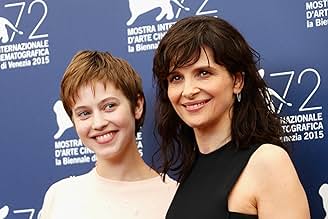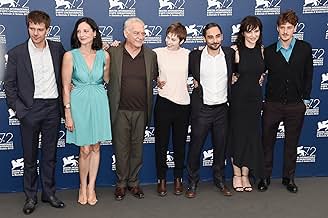CALIFICACIÓN DE IMDb
6.5/10
2.7 k
TU CALIFICACIÓN
Agrega una trama en tu idiomaA mother unexpectedly meets her son's fiancée at a villa in Sicily and gets to know her as she waits for her son to arrive.A mother unexpectedly meets her son's fiancée at a villa in Sicily and gets to know her as she waits for her son to arrive.A mother unexpectedly meets her son's fiancée at a villa in Sicily and gets to know her as she waits for her son to arrive.
- Dirección
- Guionistas
- Elenco
- Premios
- 7 premios ganados y 9 nominaciones en total
Opiniones destacadas
Without any planning, in the last few days I saw 2 films starring Lou de Laâge and although with completely different characters in both films (L'attesa and Respire) I was pleased with her capacity to enter the role . Juliette Binoche is as always one of the best actresses of her generation and always make great performances. About this L'attesa I can say that although in some parts the film goes a bit too long in the suspense, the story is well written and better represented by the cast. The image plans are very good but sometimes too still. But it is a must see film. A very good work from Francesco Di Giacomo However the story is never totality told to the audience, letting one always thinking ahead.
There is a kind of celebration that is cathartic and without it, grief can not release itself from its prison. In the space between loss and acceptance, lie denial and the hope for a miracle, for the light to shine through the heart.
In this extraordinary period of denial, time stretches into moments of grief, anger and hope, the meeting of reality with the loss of love is undefined, is fated to be revealed but if it can not, then the actions of those frozen in that vast expanse of waiting can not be predicted.
This is calm before the storm but the storm never arrives, it is the house that creaks with the stuff of haunting but the ghosts only wander into dreams.
L'attesa (The Wait) is shot in an old Sicilian villa, it moves in lingering pauses in which the exalted photographic beauty of this extended suspension, truth attempting to surface but underwater. Binoche carries the deepening mystery in precise nuanced expression. The nails hammered into the walls to shroud mirrors, the lime annointment of olive trees bleaches the trunk bone white, and awaiting the miracle, knowing in truth is freedom, unable to see past belief and hope.
Excellent film in every respect, music, photography and direction. Resolution is unavailable as the echoes of celebration fade.
In this extraordinary period of denial, time stretches into moments of grief, anger and hope, the meeting of reality with the loss of love is undefined, is fated to be revealed but if it can not, then the actions of those frozen in that vast expanse of waiting can not be predicted.
This is calm before the storm but the storm never arrives, it is the house that creaks with the stuff of haunting but the ghosts only wander into dreams.
L'attesa (The Wait) is shot in an old Sicilian villa, it moves in lingering pauses in which the exalted photographic beauty of this extended suspension, truth attempting to surface but underwater. Binoche carries the deepening mystery in precise nuanced expression. The nails hammered into the walls to shroud mirrors, the lime annointment of olive trees bleaches the trunk bone white, and awaiting the miracle, knowing in truth is freedom, unable to see past belief and hope.
Excellent film in every respect, music, photography and direction. Resolution is unavailable as the echoes of celebration fade.
Plot and character are the classic drivers of cinema but there are other forces of equal impact. Some films are driven more by what does not happen than what does, and photographic technique can transform inaction into deep meaning. This is the case in The Wait (2016), a film title that describes both the story's narrative arc and how it will be experienced by most viewers. Long silent close-ups that record little more than an eyebrow muscle tightening or the strands of hair on a neck are used to convey emotional power of surprising intensity.
Based entirely on the interaction between two women and the inability of one to reveal a painful truth to the other, the plot and character range is unusually sparse. The story opens with a funeral and the palpable raw grief on the face of a mother who has lost a son. Anna (Juliette Binoche) is in a deep dark place when she takes a call from beautiful young Jeanne (Lou de Laage) who asks why her son Giuseppe did not meet her at the airport. Anna invites Jeanne to wait for him at the Sicilian family villa, knowing he will never come. The pair move from a strained and awkward start to a warm friendship, all the while with Jeanne confused and Anna struggling with suppressed emotional turmoil. Anna has Giuseppe's cell phone and listens to Jeanne's desperate calls to her son, but withholding the truth gives him a tangible presence that keeps him alive and eases Anna's pain. For as long as she can gaze upon Jeanne, she can see through her dead son's eyes and share his delight in her innocence and charm.
This story rests entirely on the extraordinary ability of its two stars to convey the full gamut of emotion with total authenticity. The face of Binoche in particular is like a canvas onto which she paints every colour of the rainbow, with subtle shifts of expression that span joyful laughter to the very edge of sanity. Many viewers will find this a difficult film to watch because of the gradually escalating tension created by Anna holding back the truth from Jeanne, and this transforms the drama into a psychological thriller. It is impossible not to judge Anna or not to consider how we would handle such a situation, and this self-reflective process only heightens tensions both inside the film and within ourselves. The performances could easily have slipped into a melodrama, but instead, the minimalist dialogue and slow pace creates an open space into which is hung a finely wrought portrait of parental grief.
Based entirely on the interaction between two women and the inability of one to reveal a painful truth to the other, the plot and character range is unusually sparse. The story opens with a funeral and the palpable raw grief on the face of a mother who has lost a son. Anna (Juliette Binoche) is in a deep dark place when she takes a call from beautiful young Jeanne (Lou de Laage) who asks why her son Giuseppe did not meet her at the airport. Anna invites Jeanne to wait for him at the Sicilian family villa, knowing he will never come. The pair move from a strained and awkward start to a warm friendship, all the while with Jeanne confused and Anna struggling with suppressed emotional turmoil. Anna has Giuseppe's cell phone and listens to Jeanne's desperate calls to her son, but withholding the truth gives him a tangible presence that keeps him alive and eases Anna's pain. For as long as she can gaze upon Jeanne, she can see through her dead son's eyes and share his delight in her innocence and charm.
This story rests entirely on the extraordinary ability of its two stars to convey the full gamut of emotion with total authenticity. The face of Binoche in particular is like a canvas onto which she paints every colour of the rainbow, with subtle shifts of expression that span joyful laughter to the very edge of sanity. Many viewers will find this a difficult film to watch because of the gradually escalating tension created by Anna holding back the truth from Jeanne, and this transforms the drama into a psychological thriller. It is impossible not to judge Anna or not to consider how we would handle such a situation, and this self-reflective process only heightens tensions both inside the film and within ourselves. The performances could easily have slipped into a melodrama, but instead, the minimalist dialogue and slow pace creates an open space into which is hung a finely wrought portrait of parental grief.
This visually beautiful, if self-consciously arty, Italian film marks the feature debut of Piero Messina who certainly displays all the promise of a major film-maker if he can only learn to move things along at a somewhat more acceptable pace and be less concerned with the 'look' of his films and more concerned with the feelings of his characters. This is a somewhat high-toned piece based on a play by Pirandello and it's very much designed around the performances of Juliette Binoche as a grieving mother and Lou de Laage as her son's girlfriend. It's certainly well done but it also smacks of the worst kind of art-house cinema; this is Antonioni-light. See it by all means though you may have to keep pinching yourself from time to time to stay awake.
"L'Attesa" (2015 release from Italy; 99 min.; English title: "The Wait") brings the story of two women. As the movie opens, we see Anna (played by Juliette Binoche) at a church service, it looks like a funeral. Not long thereafter, Anna gets a phone call, during which she mentions "He's not here, I'm his mother, but come on over". Shortly thereafter, a young lady named Jeanne arrives at the estate (in Sicily, we later learn). She is the girlfriend of Anna's son Giuseppe. Anna tells her that Giuseppe will be back later in the week, in time for Easter. Where is Giuseppe? Why won't he take Jeanne's calls? What is really going on here? To tell you more would spoil your viewing experience, you'll just have to see for yourself how it all plays out.
Couple of comments: this is the feature debut of Italian writer-director Piero Messina, who previously was assistant-director in the Oscar-winning "The Great Beauty". Here, he builds a mystery as to why Giuseppe is absent, when he might return (or not) and what really happened to him. We are left guessing from start to finish, while we see the great Juliette Binoche deliver another towering performance as she grieves (whose funeral was that anyway? do we really believe it when Anna tells Jeanne "My brother died"?), Up-and-coming French actress Lou de Laâge as Jeanne is equally outstanding, a new talent we surely have not seen the last of. As mentioned, the movie is set in Sicily, which I typically do not associate with lakes and water, both of which are prominent in the film. Last but certainly not least, there is a ton of great music in the movie, both the original score (which director Messina co-composed I might add) and songs placements. There is a note-worthy scene in the movie which plays out as Leonard Cohen's "Waiting for the Miracle" is blaring, and the XX's "Missing" plays over the movie's end credits. There couldn't have been a more appropriate song to close out the movie.
"L'Attesa" opened this weekend at my local art-house theater here in Cincinnati and I couldn't wait to see it. The Friday early evening screening where I saw this at turned out to be a private screening: I was literally the only person in the theater, to my surprise. That said, it is clear that this movie is going to struggle to find a large audience: it is slow-moving, with no clear resolutions, and "all talk, no action". These are not criticisms as far as I'm concerned, au contraire, I found myself mesmerized by the way the movie unfolded, and this flew by in no time. If you are in the mood for a somber but top-notch foreign film dealing with grief, absence, and longing, I'd encourage you to check this out, be it in the theater, on VOD or eventually on DVD/Blu-ray. "L'Attesa" is HIGHLY RECOMMENDED!
Couple of comments: this is the feature debut of Italian writer-director Piero Messina, who previously was assistant-director in the Oscar-winning "The Great Beauty". Here, he builds a mystery as to why Giuseppe is absent, when he might return (or not) and what really happened to him. We are left guessing from start to finish, while we see the great Juliette Binoche deliver another towering performance as she grieves (whose funeral was that anyway? do we really believe it when Anna tells Jeanne "My brother died"?), Up-and-coming French actress Lou de Laâge as Jeanne is equally outstanding, a new talent we surely have not seen the last of. As mentioned, the movie is set in Sicily, which I typically do not associate with lakes and water, both of which are prominent in the film. Last but certainly not least, there is a ton of great music in the movie, both the original score (which director Messina co-composed I might add) and songs placements. There is a note-worthy scene in the movie which plays out as Leonard Cohen's "Waiting for the Miracle" is blaring, and the XX's "Missing" plays over the movie's end credits. There couldn't have been a more appropriate song to close out the movie.
"L'Attesa" opened this weekend at my local art-house theater here in Cincinnati and I couldn't wait to see it. The Friday early evening screening where I saw this at turned out to be a private screening: I was literally the only person in the theater, to my surprise. That said, it is clear that this movie is going to struggle to find a large audience: it is slow-moving, with no clear resolutions, and "all talk, no action". These are not criticisms as far as I'm concerned, au contraire, I found myself mesmerized by the way the movie unfolded, and this flew by in no time. If you are in the mood for a somber but top-notch foreign film dealing with grief, absence, and longing, I'd encourage you to check this out, be it in the theater, on VOD or eventually on DVD/Blu-ray. "L'Attesa" is HIGHLY RECOMMENDED!
¿Sabías que…?
- Trivia"L'attesa" is a period of time whose duration is unknown and therefore it symbolizes a real act of faith. In this case, this act for Anna and Jeanne consists in waiting for the return of Giuseppe, the son of Anna and Jeanne's boyfriend, with the difference that the first knows the truth, while the second lives in the mystery. The return of Giuseppe takes on the meaning of a miracle. The song "Waiting for the miracle" emphasizes this detail.
- ErroresAbout one half hour into the movie Binoche cracks an egg into a frying pan, thereby breaking the yolk. However, when she serves it to her son's girlfriend the yolk is whole.
- Citas
Anna Remigi: Jealousy means that there is still desire.
- ConexionesFeatures Arrangiatevi (1959)
- Bandas sonorasOrchestral Loop
Music by Ben Lukas Boysen
Published by Erased Tapes Music
Selecciones populares
Inicia sesión para calificar y agrega a la lista de videos para obtener recomendaciones personalizadas
- How long is L'attesa?Con tecnología de Alexa
Detalles
Taquilla
- Presupuesto
- EUR 3,200,850 (estimado)
- Total en EE. UU. y Canadá
- USD 55,804
- Fin de semana de estreno en EE. UU. y Canadá
- USD 5,686
- 1 may 2016
- Total a nivel mundial
- USD 1,010,766
- Tiempo de ejecución
- 1h 40min(100 min)
- Color
- Relación de aspecto
- 2.35 : 1
Contribuir a esta página
Sugiere una edición o agrega el contenido que falta





























